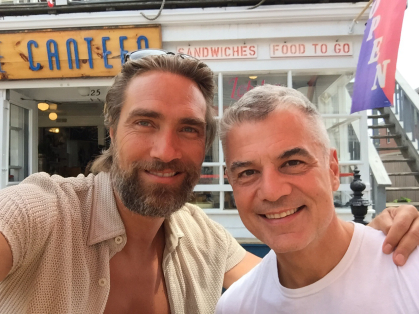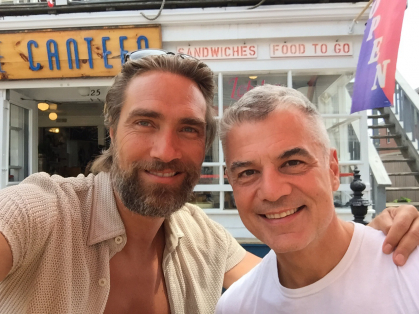An academic leader in addiction and LGBTQ+ mental health research, Petros Levounis plans to use platform to continue fighting for social justice
It was a bleak time for the LGBTQ+ community when Petros Levounis came out as a gay man in the early 1980s.
Unlike many of his peers, who were ostracized by friends and family, the Stanford pre-med student felt accepted by his loved ones. But there was no escaping the fear that gripped the queer community during the early days of the HIV/AIDS crisis.
“People were desperate and enrolled in clinical trials and would have AZT parties. They put all their pills in a big bowl, and everyone would get half the dose of the ingredient,” said Levounis, professor and chair of the Department of Psychiatry and associate dean for professional development at Rutgers New Jersey Medical School. “It was obliterating the scientific trials but delivering at least some hope to people who were so desperate at the time.”
Much has changed in the nearly four decades since Levounis studied the implications of those AZT parties for his medical school thesis. A virus that was once considered a death sentence is now treatable. Discrimination against the LGBTQ+ community that was once widespread – including laws banning marriage, military service and more – continues to recede. And in May, Levounis was elected as the first openly gay president of the American Psychiatric Association (APA) since its founding in 1844.
An academic leader in psychiatry in the fields of addiction research and LGBTQ+ mental health, Levounis is sure he is not the first LGBTQ+ person to lead the APA. He acknowledges standing on the shoulders of a few predecessors who, although they may not had been open about their sexual orientation in their professional lives, advocated on behalf of the queer community. His appointment also serves as a foil to the stigma many still face, said Levounis, pointing to Florida’s so-called “Don’t Say Gay” bill signed into law this spring by Gov. Ron DeSantis.
“I do feel like I live in a very well-protected bubble – both in my profession and my social world, working and living with likeminded people,” said Levounis, who lives in the Chelsea section of Manhattan with his actor/filmmaker husband Lukas Hassel, whom he met on the 1 Train in 2004. “We are always going forward and making advances against stigma and discrimination. But it is not uniform and unidirectional progress we are making. There is a lot of backlash. We have so much more work to do and need to be hypervigilant about this kind of effort to push the clock back.”

The APA’s history of combating homophobia began with its decision to remove homosexuality from its list of mental illnesses nearly 50 years ago in 1973. Levounis’s priorities as APA president include continuing to amplify that message as well as psychiatrists’ stance against systemic racism and climate change. He also plans to fight for parity in reimbursement of clinical services for mental health on par with other medical specialties. Above all, he is committed to building more residencies and developing innovative career pathways for young psychiatrists to meet America’s growing need for mental health services.
“For the longest time psychiatrists would be screaming from the rooftops that we should pay more attention to mental health, and then the pandemic accelerated an appreciation of mental health issues from society at large,” said Levounis. “It has caught us by surprise, and we do not have the workforce to respond to this enormous demand for psychiatric services. The scarcity of psychiatrists is even more acute in the state of New Jersey.”
Growing up in Piraeus, the port of Athens, Greece, Levounis thought he’d follow in his father’s footsteps and become an internist and asthma specialist. For 50 years, the family patriarch tended to patients in his home office with the assistance of his wife, who is a nurse.
But Levounis fell in love with the study of chemistry and psychiatry at Stanford University, receiving his medical education there and at the Medical College of Pennsylvania. His training in psychiatry followed at the New York State Psychiatric Institute of Columbia University.
“It was fascinating to see what’s going on in a deeper level in people’s heads. Why we act the way we act. Why we feel the way we feel,” said Levounis, who completed a fellowship in addiction psychiatry at New York University, was a Betty Ford Scholar and served as director of the Addiction Institute of New York at Columbia University for more than a decade. “It wasn’t just understanding mental illness that fascinated me but doing something about it.”
His affinity for chemistry and psychiatry led Levounis to focus on addiction research, where he said he could appreciate both on a molecular level and a societal level the way chemicals and environmental determinants combined to shape his patients’ lives. In the late 1990s and early 2000s, as an addiction specialist living in Manhattan, Levounis had a front row seat to the crystal methamphetamine crisis growing among his patients – in particular gay men. That, in combination with the stigma he’d experienced as a gay man, expanded his area of research to include mental health issues affecting the LGBTQ+ population.
In his decade at Rutgers, Levounis has continued to expand his areas of expertise to include sexual addiction and gaming/technology addiction, and has studied the connections between autism and addiction. He also advocated for resources to try to stem the opioid crisis and provide rehabilitation for those in need and pushed to help launch programs to benefit his LGBTQ+ patients, including New Jersey Medical School’s Center for Transgender Health and OUT at NJMS, the LGBTQ+ medical student group.
“I’m incredibly proud of the things we’ve accomplished. I’m sure I made the right choice to cross the river to come to Rutgers,” he said. “There is a very deep and organic commitment to diversity, equity and inclusion here. This is something everybody in 2022 claims to be committed to, but our school is ahead of everybody else. That is something I’m particularly proud of and part of, what attracted me to Rutgers, and what keeps me going every day.”








